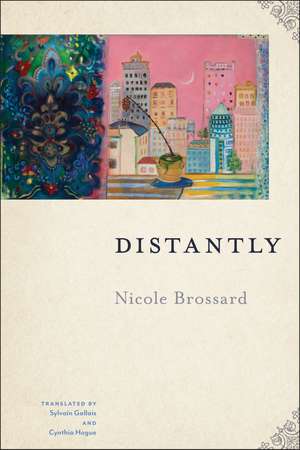Distantly
Autor Nicole Brossard Traducere de Sylvain Gallais, Cynthia Hogueen Limba Engleză Paperback – 22 sep 2022
This bilingual edition of Nicole Brossard’s lyrical poetry is a sequence of lush, taut cityscapes. Known for her elliptical and materially grounded poetics, Brossard creates an intimate series of poems drawn loosely from urban experience. The poems comprise an evocative distillation of postmodern urban life with a sharp sense of cultural and gendered histories of violence and beauty and struggles for survival and intimacy. The poems capture the emotional and ecological surroundings of each city and its people. The cities in Brossard’s poems feel surreal and in them dwell survivors of “misfortunes,” living in urban landscapes with their “gleaming debris” and “bridges, ghats, / rivers in a time of peace and torture.” These poems gesture toward a transmuted social context and toward a quest “to meet the horizon the day after the horizon.”
Preț: 115.10 lei
Nou
Puncte Express: 173
Preț estimativ în valută:
22.03€ • 22.91$ • 18.18£
22.03€ • 22.91$ • 18.18£
Carte disponibilă
Livrare economică 24 martie-07 aprilie
Livrare express 07-13 martie pentru 15.58 lei
Preluare comenzi: 021 569.72.76
Specificații
ISBN-13: 9781632431011
ISBN-10: 1632431017
Pagini: 88
Ilustrații: 1 halftone
Dimensiuni: 152 x 229 x 20 mm
Greutate: 0.14 kg
Editura: Omnidawn Publishing, Inc.
Colecția Omnidawn
ISBN-10: 1632431017
Pagini: 88
Ilustrații: 1 halftone
Dimensiuni: 152 x 229 x 20 mm
Greutate: 0.14 kg
Editura: Omnidawn Publishing, Inc.
Colecția Omnidawn
Notă biografică
Nicole Brossard has published over thirty books, including Ardeur, Lointaines, Piano blanc, Lumière, and fragment d’envers. In 2019, she was awarded the Lifetime Recognition Award from the Griffin Trust for Excellence in Poetry. Sylvain Gallais is emeritus professor of economics at Université Francois Rabelais (Tours, France) and of French in the School of International Letters and Culture at Arizona State University. He is coauthor of France Encounters Globalization. Cynthia Hogue is a translator, poet, and the inaugural Marshall Chair in Poetry Emerita Professor of English at Arizona State University. She is the author of several books, most recently In June the Labyrinth.
Recenzii
“One of the most outstanding writers of her generation, known for her feminist commitment and innovative aesthetics, Brossard here turns her incisive imagination to cities, evoking them through details that range from the austere to the flamboyant. And always as lived: she shows them not as abstractions, but as extensions of the people that live them, just as the people are, in turn, constructions of the cities in which they live. Gallais and Hogue capture all the complexity of Brossard's subtle implications and slippery imagery in a translation that reads with the grace and conviction of the original.”
“To accompany Brossard in poetry through her many cities, in the marvelous English versions of Gallais and Hogue, is to be captivated again by the world we are always—almost—on the brink of losing or ruining. Her cities float before our eyes as desire incarnate, though she does not ignore that they are riddled with inequalities, contused by environmental degradation, jostled by misapprehensions, and just plain tired. Brossard’s steady and generous gaze infuses joy despite adversity. Here, language itself penetrates beautifully to reanimate our contradictory love of the world. In her wide embrace of the cities that we inhabit, Brossard wills us toward better, toward recognizing each other’s humanity enduringly, in an openness that brings distances closer, into the heart.”
“’always I take up my cities again . . .’ Uncommon sites, dreamscapes, distillations of experience as place; provocative, improvisatory, allusive, opening vistas both unexpected and déjà vu: ‘cities suspended above the hours’ and ‘cities really . . . with their mounds of women and stones”’—effluence of too much history. A cosmopolitan of interiority, Brossard creates meta-cities where the political lies down with the poetic, where distance lives in the lyric’s eternal present tense. Distantly doesn’t feel like translation, but like the discovery of a wholly original poet newly minted in English.”
